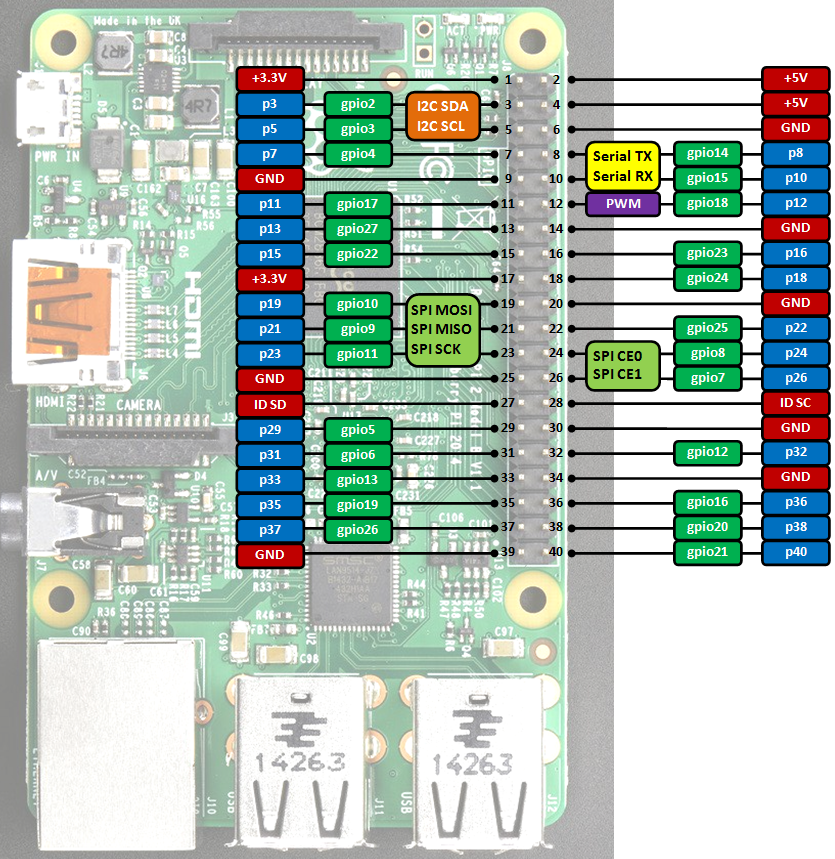mbed API for Raspberry Pi boards.
mbedPi
This is an attempt to implement a limited number of mbed APIs for Raspberry Pi single-board computers. The project was inspired by and based on the arduPi library developed for the Arduino by Cooking Hacks .
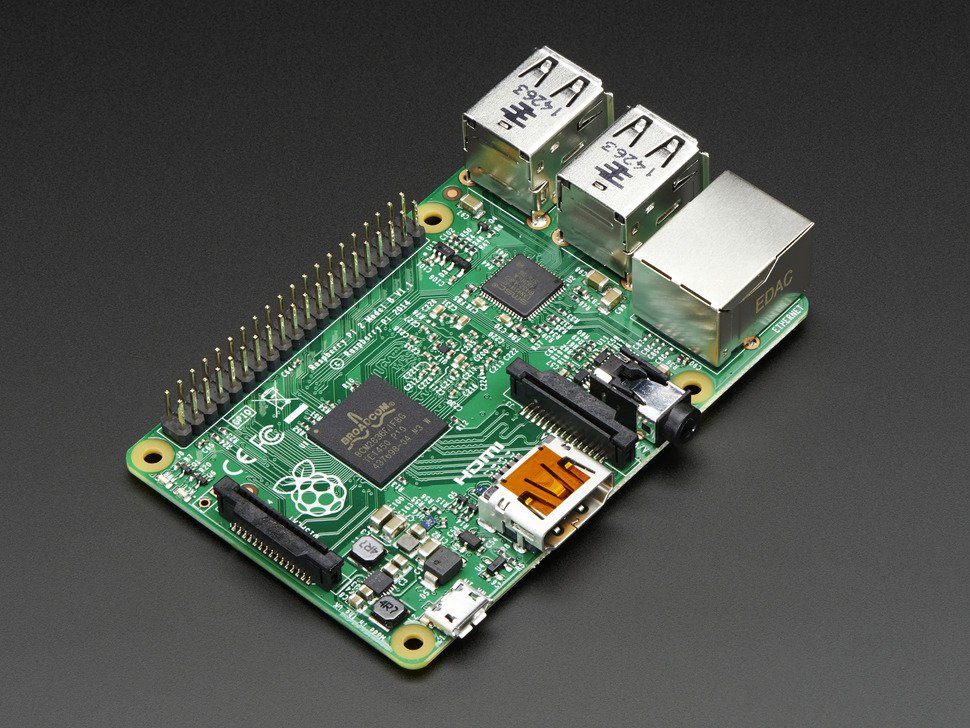
Specifications
- Chip: Broadcom BCM2836 SoC
- Core architecture: Quad-core ARM Cortex-A7
- CPU frequency: 900 MHz
- GPU: Dual Core VideoCore IV® Multimedia Co-Processor
- Memory: 1GB LPDDR2
- Operating System: Boots from Micro SD card, running a version of the Linux operating system
- Power: Micro USB socket 5V, 2A
Connectors
- Ethernet: 10/100 BaseT Ethernet socket
- Video Output: HDMI (rev 1.3 & 1.4)
- Audio Output: 3.5mm jack, HDMI
- USB: 4 x USB 2.0 Connector
- GPIO Connector: 40-pin 2.54 mm (100 mil) expansion header: 2x20 strip providing 27 GPIO pins as well as +3.3 V, +5 V and GND supply lines
- Camera Connector: 15-pin MIPI Camera Serial Interface (CSI-2)
- JTAG: Not populated
- Display Connector: Display Serial Interface (DSI) 15 way flat flex cable connector with two data lanes and a clock lane
- Memory Card Slot: Micro SDIO
GPIO connector pinout
Information
Only the labels printed in blue/white or green/white (i.e. p3, gpio2 ...) must be used in your code. The other labels are given as information (alternate-functions, power pins, ...).
Building programs for the Raspberry Pi with mbedPi
I use Qt Creator for development, however you can use any other IDE available on the Raspberry Pi (e.g. Geany) if you like. For a quick try:
- Install Qt and the Qt Creator onto your Raspberry Pi. Then create a new "Blinky" Plain non-Qt C++ Project as follows:
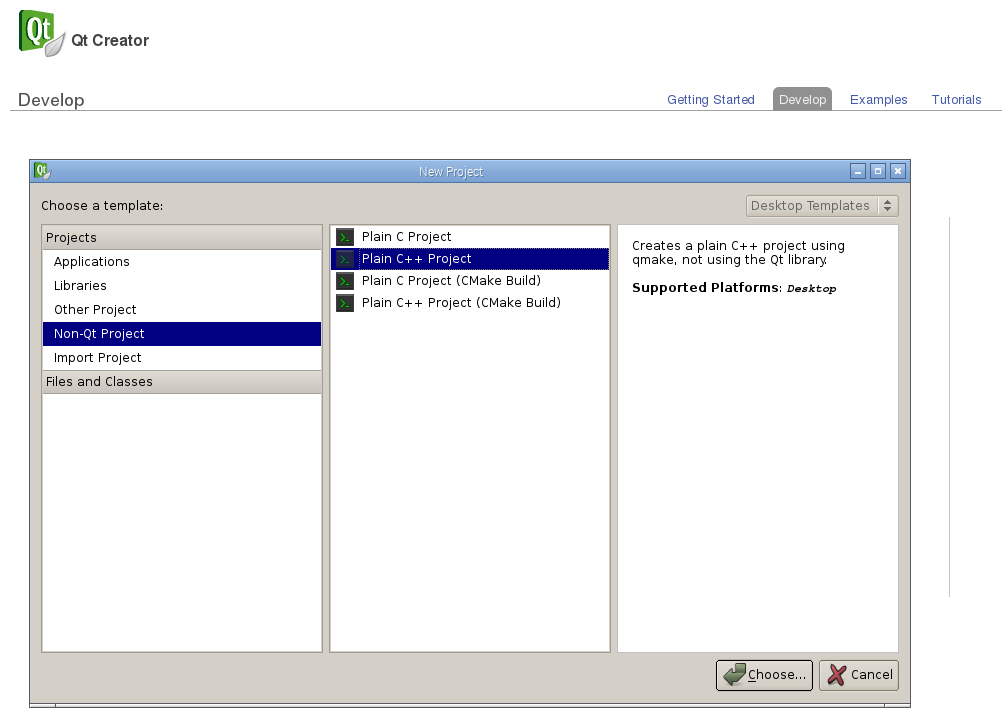
- Change the main code as below:
main.cpp
#include "mbedPi.h"
int main()
{
DigitalOut myled(p7);
while(1) {
myled = 1; // LED is ON
wait(0.2); // 200 ms
myled = 0; // LED is OFF
wait(1.0); // 1 sec
printf("Blink\r\n");
}
}
- Copy the mbedPi.zip file into your project's folder and unzip.
- Add the mbedPi.h and mbedPi.cpp files to your project by right clicking on the "Blinky" project and then clicking on the "Add Existing Files..." option in the local menu:
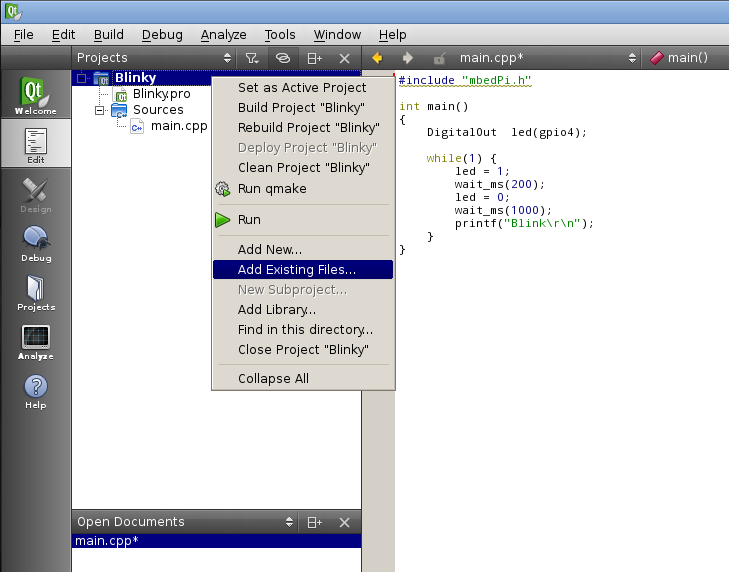
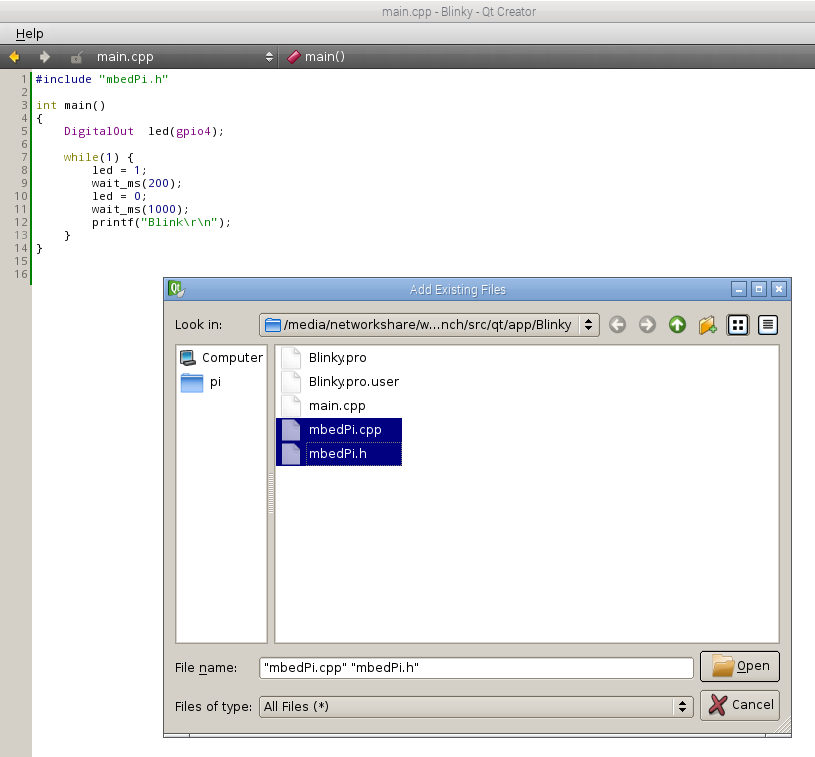
- Double click on Blinky.pro to open it for editing and add new libraries by inserting a new line as follows:
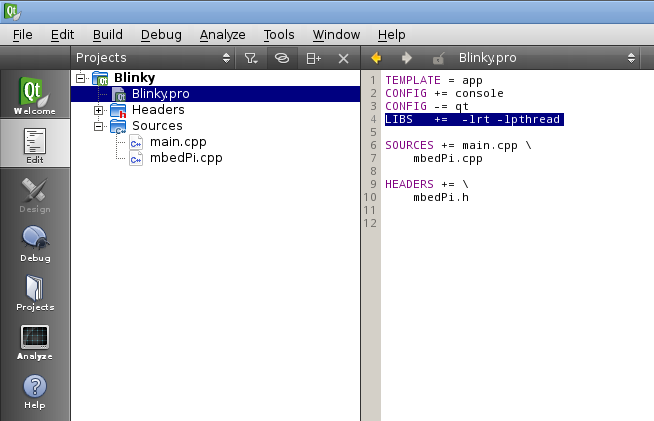
- Compile the project.
- Connect an LED through a 1k resistor to pin 7 and the ground on the Raspberry Pi GPIO connector.
- Run the binary as sudo (sudo ./Blinky) and you should see the LED blinking.

- Press Ctrl+c to stop running the application.
source/Serial.cpp
- Committer:
- hudakz
- Date:
- 22 months ago
- Revision:
- 2:131555dc6fb7
- Parent:
- 1:1f2d9982fa8c
File content as of revision 2:131555dc6fb7:
#include "mbed.h"
#include <stdarg.h>
/**
* @brief
* @note
* @param
* @retval
*/
Serial::Serial()
{
//if((tx == gpio14) && (tx == gpio15)) {
REV = getBoardRev();
serialPort = "/dev/ttyAMA0";
timeOut = 1000;
//baud(9600);
//}
}
/**
* @brief
* @note
* @param
* @retval
*/
void Serial::baud(int baudrate)
{
switch (baudrate) {
case 50:
speed = B50;
break;
case 75:
speed = B75;
break;
case 110:
speed = B110;
break;
case 134:
speed = B134;
break;
case 150:
speed = B150;
break;
case 200:
speed = B200;
break;
case 300:
speed = B300;
break;
case 600:
speed = B600;
break;
case 1200:
speed = B1200;
break;
case 1800:
speed = B1800;
break;
case 2400:
speed = B2400;
break;
case 9600:
speed = B9600;
break;
case 19200:
speed = B19200;
break;
case 38400:
speed = B38400;
break;
case 57600:
speed = B57600;
break;
case 115200:
speed = B115200;
break;
default:
speed = B230400;
break;
}
if ((sd = open(serialPort, O_RDWR | O_NOCTTY | O_NDELAY | O_NONBLOCK)) == -1) {
fprintf(stderr, "Unable to open the serial port %s - \n", serialPort);
exit(-1);
}
fcntl(sd, F_SETFL, O_RDWR);
tcgetattr(sd, &options);
cfmakeraw(&options);
cfsetispeed(&options, speed);
cfsetospeed(&options, speed);
options.c_cflag |= (CLOCAL | CREAD);
options.c_cflag &= ~PARENB;
options.c_cflag &= ~CSTOPB;
options.c_cflag &= ~CSIZE;
options.c_cflag |= CS8;
options.c_lflag &= ~(ICANON | ECHO | ECHOE | ISIG);
options.c_oflag &= ~OPOST;
tcsetattr(sd, TCSANOW, &options);
ioctl(sd, TIOCMGET, &status);
status |= TIOCM_DTR;
status |= TIOCM_RTS;
ioctl(sd, TIOCMSET, &status);
unistd::usleep(10000);
}
/**
* @brief
* @note
* @param
* @retval
*/
void Serial::printf(const char* format, ...)
{
char* buf;
va_list args;
va_start(args, format);
vasprintf(&buf, format, args);
va_end(args);
unistd::write(sd, buf, strlen(buf));
free(buf);
}
/* Writes binary data to the serial port. This data is sent as a byte
* Returns: number of bytes written */
int Serial::write(uint8_t message)
{
unistd::write(sd, &message, 1);
return 1;
}
/* Writes binary data to the serial port. This data is sent as a series
* of bytes
* Returns: number of bytes written */
int Serial::write(const char* message)
{
int len = strlen(message);
unistd::write(sd, &message, len);
return len;
}
/* Writes binary data to the serial port. This data is sent as a series
* of bytes placed in an buffer. It needs the length of the buffer
* Returns: number of bytes written */
int Serial::write(char* message, int size)
{
unistd::write(sd, message, size);
return size;
}
/**
* @brief
* @note
* @param
* @retval
*/
int Serial::readable()
{
int nbytes = 0;
if (ioctl(sd, FIONREAD, &nbytes) < 0) {
fprintf(stderr, "Failed to get byte count on serial.\n");
exit(-1);
}
return(nbytes > 0 ? 1 : 0);
}
/* Reads 1 byte of incoming serial data
* Returns: first byte of incoming serial data available */
char Serial::read()
{
unistd::read(sd, &c, 1);
return c;
}
/* Reads characters from th serial port into a buffer. The function
* terminates if the determined length has been read, or it times out
* Returns: number of bytes readed */
int Serial::readBytes(char message[], int size)
{
clock_gettime(CLOCK_PROCESS_CPUTIME_ID, &time1);
int count;
for (count = 0; count < size; count++) {
if (readable())
unistd::read(sd, &message[count], 1);
clock_gettime(CLOCK_PROCESS_CPUTIME_ID, &time2);
timespec t = timeDiff(time1, time2);
if ((t.tv_nsec / 1000) > timeOut)
break;
}
return count;
}
/* Reads characters from the serial buffer into an array.
* The function terminates if the terminator character is detected,
* the determined length has been read, or it times out.
* Returns: number of characters read into the buffer. */
int Serial::readBytesUntil(char character, char buffer[], int length)
{
char lastReaded = character + 1; //Just to make lastReaded != character
int count = 0;
clock_gettime(CLOCK_PROCESS_CPUTIME_ID, &time1);
while (count != length && lastReaded != character) {
if (readable())
unistd::read(sd, &buffer[count], 1);
lastReaded = buffer[count];
count++;
clock_gettime(CLOCK_PROCESS_CPUTIME_ID, &time2);
timespec t = timeDiff(time1, time2);
if ((t.tv_nsec / 1000) > timeOut)
break;
}
return count;
}
/**
* @brief
* @note
* @param
* @retval
*/
bool Serial::find(const char* target)
{
findUntil(target, NULL);
}
/* Reads data from the serial buffer until a target string of given length
* or terminator string is found.
* Returns: true if the target string is found, false if it times out */
bool Serial::findUntil(const char* target, const char* terminal)
{
int index = 0;
int termIndex = 0;
int targetLen = strlen(target);
int termLen = strlen(terminal);
char readed;
timespec t;
clock_gettime(CLOCK_PROCESS_CPUTIME_ID, &time1);
if (*target == 0)
return true; // return true if target is a null string
do
{
if (readable()) {
unistd::read(sd, &readed, 1);
if (readed != target[index])
index = 0; // reset index if any char does not match
if (readed == target[index]) {
if (++index >= targetLen) {
// return true if all chars in the target match
return true;
}
}
if (termLen > 0 && c == terminal[termIndex]) {
if (++termIndex >= termLen)
return false; // return false if terminate string found before target string
}
else {
termIndex = 0;
}
}
clock_gettime(CLOCK_PROCESS_CPUTIME_ID, &time2);
t = timeDiff(time1, time2);
} while ((t.tv_nsec / 1000) <= timeOut);
return false;
}
/* returns the first valid (long) integer value from the current position.
* initial characters that are not digits (or the minus sign) are skipped
* function is terminated by the first character that is not a digit. */
long Serial::parseInt()
{
bool isNegative = false;
long value = 0;
char c;
//Skip characters until a number or - sign found
do
{
c = peek();
if (c == '-')
break;
if (c >= '0' && c <= '9')
break;
unistd::read(sd, &c, 1); // discard non-numeric
} while (1);
do
{
if (c == '-')
isNegative = true;
else
if (c >= '0' && c <= '9') // is c a digit?
value = value * 10 + c - '0';
unistd::read(sd, &c, 1); // consume the character we got with peek
c = peek();
} while (c >= '0' && c <= '9');
if (isNegative)
value = -value;
return value;
}
/**
* @brief
* @note
* @param
* @retval
*/
float Serial::parseFloat()
{
boolean isNegative = false;
boolean isFraction = false;
long value = 0;
char c;
float fraction = 1.0;
//Skip characters until a number or - sign found
do
{
c = peek();
if (c == '-')
break;
if (c >= '0' && c <= '9')
break;
unistd::read(sd, &c, 1); // discard non-numeric
} while (1);
do
{
if (c == '-')
isNegative = true;
else
if (c == '.')
isFraction = true;
else
if (c >= '0' && c <= '9') {
// is c a digit?
value = value * 10 + c - '0';
if (isFraction)
fraction *= 0.1;
}
unistd::read(sd, &c, 1); // consume the character we got with peek
c = peek();
} while ((c >= '0' && c <= '9') || (c == '.' && isFraction == false));
if (isNegative)
value = -value;
if (isFraction)
return value * fraction;
else
return value;
}
// Returns the next byte (character) of incoming serial data without removing it from the internal serial buffer.
char Serial::peek()
{
//We obtain a pointer to FILE structure from the file descriptor sd
FILE* f = fdopen(sd, "r+");
//With a pointer to FILE we can do getc and ungetc
c = getc(f);
ungetc(c, f);
return c;
}
// Remove any data remaining on the serial buffer
void Serial::flush()
{
while (readable()) {
unistd::read(sd, &c, 1);
}
}
/* Sets the maximum milliseconds to wait for serial data when using SerialPI::readBytes()
* The default value is set to 1000 */
void Serial::setTimeout(long millis)
{
timeOut = millis;
}
//Closes serial communication
void Serial::close()
{
unistd::close(sd);
}
/*******************
* Private methods *
*******************/
//Returns a timespec struct with the time elapsed between start and end timespecs
timespec Serial::timeDiff(timespec start, timespec end)
{
timespec temp;
if ((end.tv_nsec - start.tv_nsec) < 0) {
temp.tv_sec = end.tv_sec - start.tv_sec - 1;
temp.tv_nsec = 1000000000 + end.tv_nsec - start.tv_nsec;
}
else {
temp.tv_sec = end.tv_sec - start.tv_sec;
temp.tv_nsec = end.tv_nsec - start.tv_nsec;
}
return temp;
}
